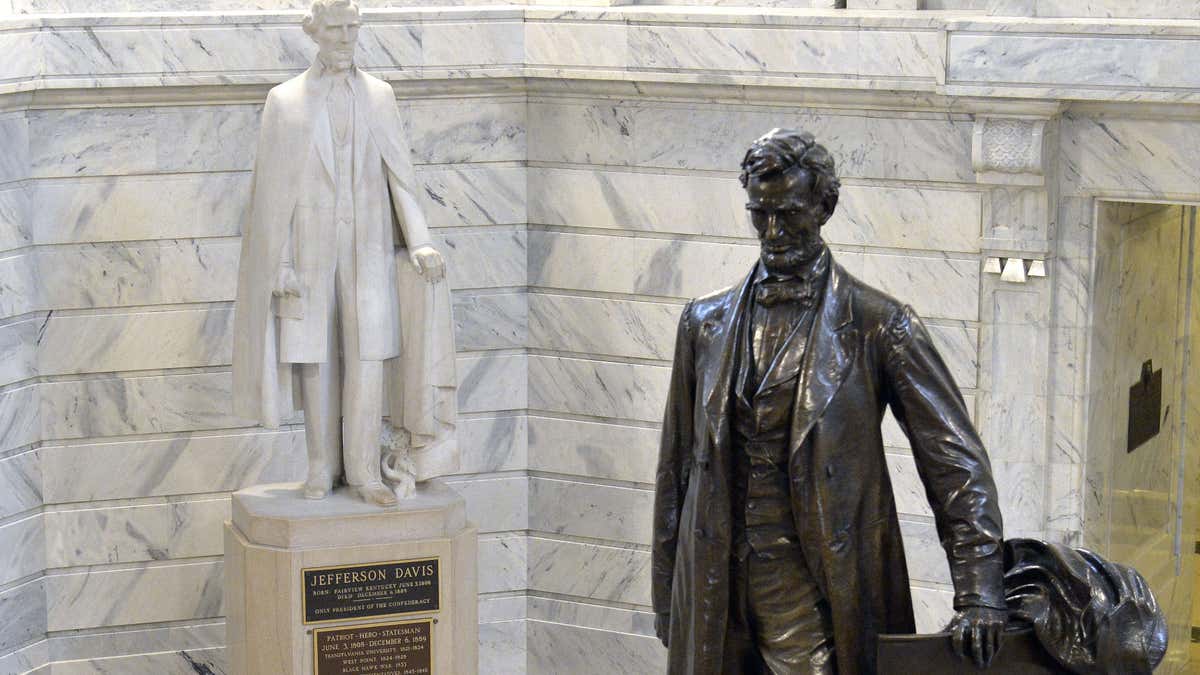
Aug. 5, 2015: The statue of Jefferson Davis, left, overlooks the statue of Abraham Lincoln in the Rotunda of the Kentucky State Capitol in Frankfort Ky. (AP)
FRANKFORT, Ky. – A Kentucky commission will not remove a statue of Jefferson Davis from the state Capitol, saying the likeness of the Confederate president juxtaposes nicely with an imposing statue of fellow Kentucky native Abraham Lincoln as a testimony to the state's divisive history during and after the Civil War.
The Historic Properties Advisory Commission voted 7-2 on Wednesday to keep the statue in the cavernous rotunda but add an "educational context" to the display for the thousands of schoolchildren and other visitors who pass through the state Capitol every year. By state law, the commission has final authority over what is displayed in the Capitol.
"I bet we are the only capitol rotunda in United States where you can walk in to see a statue of Jefferson Davis and Abraham Lincoln in that proximity. That speaks volumes about the divide that Kentucky felt during the Civil War," commission chairman Steve Collins said just before voting to keep the statue. "Removing the statue of Jefferson Davis makes it impossible for us to tell that story the way that we can tell it with both statues there."
The vote by the all-white commission followed the racially motivated slayings of nine black church members in South Carolina that prompted a re-examination of Confederate symbolism across the South. The man accused in the killings had posed for online photos with the Confederate battle flag.
In South Carolina, lawmakers voted to remove that flag from the statehouse grounds. And in Virginia, where Richmond was capital of the Confederacy, Democratic Gov. Terry McAuliffe ordered the state to phase out state license plates that display a Confederate flag.
But there was scant discussion of race as the Kentucky commission debated whether the statues in the rotunda were meant purely for educational purposes or to honor those individuals and what they stood for.
"I think you can certainly define it as educational. At the same time, by its very existence you cannot deny that placing a statue there gives it a certain importance and that somehow the state government upholds the figure there for whatever that person represents," said Commissioner Nash Cox, who voted against keeping the statue.
The commission took its vote after receiving about 3,000 public comments. Of those, about 1,800 asked to keep the statue while 1,225 called for it to be removed. Both major party nominees for Kentucky governor have called for the statue's removal, as have other state politicians from both political parties. The Sons of Confederate Veterans opposed the removal, holding a rally at the statehouse last month calling on lawmakers to respect the state's history.
Kentucky's Democratic Gov. Steve Beshear withheld judgment about the commission's decision, but he said adding an educational component is critical.
"We must ensure that dark chapter of our nation's past serves to educate in ways that ensure such a tragedy can never happen again, Beshear said in a news release.
While Kentucky has always revered Lincoln it has had an on-again off-again enthusiasm for the Confederate president. Davis graduated from Transylvania University in Lexington and was a Mexican-American war hero in the U.S. Army. But he was not welcome in Kentucky during the Civil War. Kentucky never left the Union, and it later expelled a "shadow" Confederate state government that had been headquartered in Bowling Green.
After the war Davis' reputation underwent a renaissance in Kentucky. In 1924 a brigade of Kentucky Confederate veterans, known as the "orphan brigade" because they had been cut off from their home state, raised about $200,000 to construct a 351-foot-tall obelisk similar to the Washington monument honoring Davis in his hometown. State taxpayers pay to maintain that site today. It lists Davis as "a reluctant secessionist" on its website.
In 1936, a statue of Davis was unveiled in the rotunda of the then-new Kentucky state Capitol.
Louisville NAACP president Raoul Cunningham noted that in a Frankfort newspaper from the day after the statue was dedicated, then-Gov. Albert "Happy" Chandler was quoted as saying: "Jefferson Davis is not dead. He still lives in the heart of the people and will continue with this statue."
"I think that symbolizes what that statue represents. It represents more than the educational tools," he said. "We still think it should be removed."












































